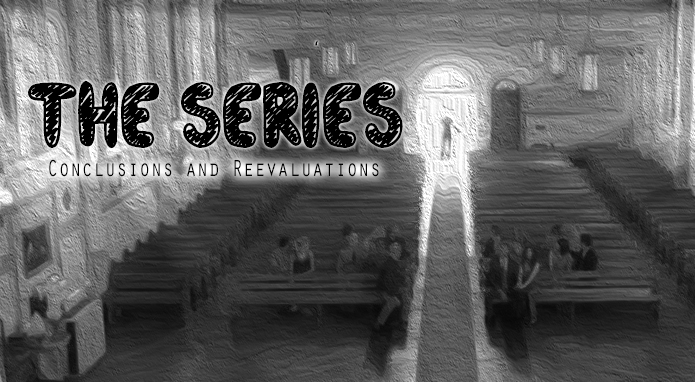//We Have To Go Back
I have no doubt that without a lot of the pointless chases through the jungle and frequent distractions of greater character-centric arcs, supposed mysteries would become clearer – like that “The Incident” causes the pregnancy problem on the Island and the Sickness is an infection of the Dark/Man-In-Black influence. However, would they have any degree of resonance without the character work done throughout the series? Of course not.
In terms of a complete narrative, I’m fine admitting Lost was ultimately about the characters and their relationships to each other and themselves. That’s the story that the series told in its entirety, which means it’s the broadest definition of what Lost was. Yet there are still the pieces of the mythology left scattered throughout the series, nested inside larger narratives, even if the full picture wasn’t presented by the time the story had reached its end.
Ultimately, certain questions were never answered on the show proper. Supplemental materials provided answers to in-series questions about the Dharma drops and the Hurley bird. Yet, Lost was well plotted while it was being written under the stresses of actual production and telling a story with only the faint idea of a thematic ending. It succeeds in hindsight, even with the mechanic neutering of knowing the end and beginning. You can skip to just the plot you want to see, like I did, or watch the thing all the way through again. The transition between the two approaches doesn’t require an editing experiment, just the slider on your streaming device.
In the end, I think I have more questions about the mechanics of storytelling than answers about Lost.
Like: If an arc that contains another–like how the A plot on the island includes the Flashes– how valuable is the nested arc? If it never comes up again, it’s worthless (how Jack got his tattoo), but if it contains a nugget of plot or character necessary for later, convention dictates it be re-capped, which invalidates its original purpose outside of taking simple pleasure in the exercise of reinterpreting a stereotype.
I was delighted to learn that certain scenes in Lost consisted of a core that was just enough to satiate a momentary craving. Then I got curious about what lead to those scenes and came to an arc. Then I got curious about that arc and moved on to two other episodes…that lead to a season…that lead to a series.
And that’s a re-watch motivated by pure storytelling curiosity–not an initial viewing lead by the ephemeral high of a mystery show.
Another thing that was made very clear is that the questions I had at the end of the series existed for a reason: the questions I thought were “unanswered” were simply not completely answered.
While going through the series at the macro-most plot level, it’s very obvious from context clues that The Heart of the Island is an electro-magnetic surge that motivates all actions at the Hatch and causes birth defects and time jumps whenever someone tries to tamper with it (usually using The Orchid’s Ice Donkey Wheel). It becomes obvious that the DHARMA Initiative never existed outside of the conflict-ridden history of the Island. It becomes obvious why Ben stopped being a candidate. These “answers” all come through context clues, unlike the fact that Desmond caused the crash of Oceanic 815, which came from the direct dialogue of the characters. Which is to say the answers exist if you want to look for them in the realm of fandom (or subjectivity), not in the realm of concrete answers.
At the end of my selective re-watch, I had the same questions as I had after my first viewing of Lost, but I also had at my disposal all the context clues from the Island scenes in an easily digestible, linear format. In an attempt to directly address the questions I had at the end of my initial, real-time viewing of Lost, I only needed to use pieces from 22 episodes.
To connect the gaps of the context clues, I used post-series interviews with showrunners Damon Lindelof and Carlton Cuse and series bonus material from the Alternate Reality Game “The Lost Experience” and the Complete Series Blu-Ray pack of delicious extras. All this just seems to reinforce the idea that the storytellers of Lost were living in a time of narrative transition. It’s possible they were just as surprised as the rest of us with the television storytelling environment become more complex, as their show (or possibly because their show) was forced into more plot-based backflips.

Comments